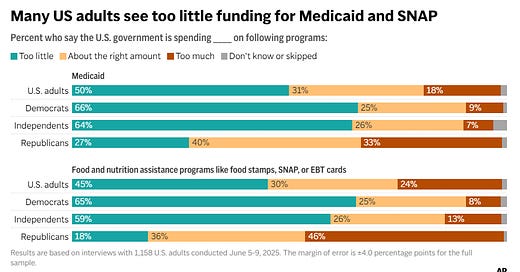Senate Budget Bill Update: SNAP Cuts are Back. Medicaid Cuts Questioned. GOP Getting Pushback from House. And More.
Budget reconciliation negotiations will continue over the weekend. Republican Senate leaders are struggling to write a bill that can pass the Senate and House while complying with Senate rules.
Republican leaders are just a week away from their self-imposed deadline to pass President Donald Trump’s signature domestic policy agenda: cutting more than $4 trillion in taxes for his rich friends and donors by slashing domestic health care, food, government services, and the broad non-military public sector spending. Even with the proposed spending cuts, the Republican reconciliation draft explodes the federal debt and deficit by trillions of dollars. (NOTE—Remember that the next time the Republicans pretend to care about budget deficits).
Public pressure and organizing are growing as people learn more about the Republican plans to provide benefits to a handful of billionaires while harming poor and working class people. The Republican agenda is not popular despite their election victories. The two largest programs facing cuts, Medicaid and SNAP (the Supplemental Food Assistance Program formerly known as food stamps), regularly poll well. A recent Associated Press poll, for instance, found that bipartisan and Independent majorities believe that Medicaid and SNAP funding are either “too little” or “about the right amount.

With regard to SNAP, Senate Republicans overcame an earlier Parliamentarian ruling yesterday by making small changes to implementation of proposed state-cost-share requirements due to error rates for the nation’s largest anti-hunger program. The updated GOP SNAP plan allows some flexibility in determining error rates and extends the timeline for enacting state cost-share mandates until 2028. The new plan also zeroes out state cost-share requirements for states with less than 6% error rates.
Proposed Medicaid cuts are a very different story. The Senate Parliamentarian ruled this week that draft plans to shift more Medicaid costs to states by limiting the “provider tax” violated Senate budget rules and was not eligible to avoid the 60-vote filibuster threshold on the Senate floor. This ruling is bolstering a group of Republican Senators speaking out against these Medicaid changes that would make it difficult for rural hospitals to stay open.
Parliamentary rulings on Senate budget reconciliation rules (the “Byrd rule”) are still pending on numerous GOP draft provisions. Just this morning (June 27, 2025), the Parliamentarian found that some tax changes were not compliant. This “work-in-progress” legislative process means that things are likely to change before a final draft floor package is put together by Senate Majority Leader John Thune (R-SD).
Once the reconciliation package proceeds to the full Senate chamber, many, many amendments are likely to be debated and voted on. If the bill is able to clear the Senate, it will then go back to the House who can either vote up-or-down on the Senate bill or call for more negotiations through a conference committee of members of both chambers.
At this point, it is clear that Republicans are currently having trouble moving their reconciliation package due to internal party squabbles. President Trump is upping his pressure on GOP members to meet the Fourth of July deadline. Budget negotiations will continue over the weekend, as Republicans try to thread a political needle all in the service of punishing poor and working class people to pay for lower taxes for billionaires, multimillionaires, and wealthy corporations.
The Cocklebur covers rural policy and politics from a progressive point-of-view. Our work focuses on a tangled rural political reality of dishonest debate, economic and racial disparities, corporate power over our democracy, and disinformation peddled by conservative media outlets. We aim to use facts, data, and science to inform our point-of-view. We wear our complicated love/WTF relationship with rural America on our sleeve.




I am disappointed that the SNAP snafu was able to make it through the parliamentarians rule. All the little tweaks and edits still does not make a good bill. It is hard to believe that Republicans care about the people they are supposed to serve.